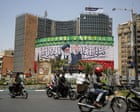
In a series of recent developments unfolding around the globe, countries and their leaders are tackling significant challenges and making progressive strides in social and foreign policy matters. While these situations illustrate the intricate dynamics of geopolitics and societal evolution, they also present opportunities for thoughtful discourse and positive change.
Leading the headlines in Europe, the attention is drawn to a significant decision on Iran’s nuclear program. The UK, France, and Germany have collectively called for tangible and verifiable action from Iran concerning its nuclear ambitions. These European nations have announced that unless Iran provides a firm commitment to contain its nuclear initiatives by the end of August, they will proceed with reinstating global embargos on arms, banking activities, and nuclear equipment that were previously lifted a decade ago. This move underscores the delicate balance of international diplomacy, demonstrating both resolve and a window for negotiation and mutual security interests.
Meanwhile, in France, Prime Minister François Bayrou has proposed the controversial removal of two public holidays as a measure to address the country’s mounting fiscal challenges. The potential shift, which involves transforming Easter Monday and the 8th of May (Victory Day commemoration) into regular working days, is part of a broader vision for the 2026 budget aimed at reducing the national deficit and bolstering economic resilience. While this proposal has sparked criticism among those who see it as an encroachment on cultural traditions, the dialogue opens avenues to explore innovative approaches to managing public spending and stimulating growth without eroding cultural heritage.
Turning the focus to educational reform in England, new guidelines have been introduced to navigate the sensitive topics of biological sex and gender identity within schools. The updated relationships, sex, and health education (RSHE) guidance encourages an ‘age-appropriate’ approach, emphasizing a balanced education on legal aspects while avoiding advocacy of particular views as singular truths. This policy aims to foster an inclusive and respectful learning environment, encouraging students to explore diverse perspectives with an open and empathetic mindset, crucial for personal development and social cohesion.
In social justice news, the appointment of Clive Foster as the new Windrush commissioner marks a renewed commitment to advocating for marginalized communities. Foster has expressed a forthright intention to extend his role beyond symbolic gestures, aiming to confront discrimination actively across several systemic areas, including housing, education, employment, and policing. His pledge to hold candid conversations with authorities, including the immigration minister, highlights a proactive approach to fostering equity and inclusion, ensuring that the voices of marginalized groups are amplified and heard.
As these stories unfold, they invite us to reflect on the nuances of policy-making and societal development. Each decision and initiative carries its complexities and potential to shape the future positively. By maintaining an open dialogue and considering diverse perspectives, the international community continues to navigate a path towards a more informed, inclusive, and harmonious global society.
Source: {link}
